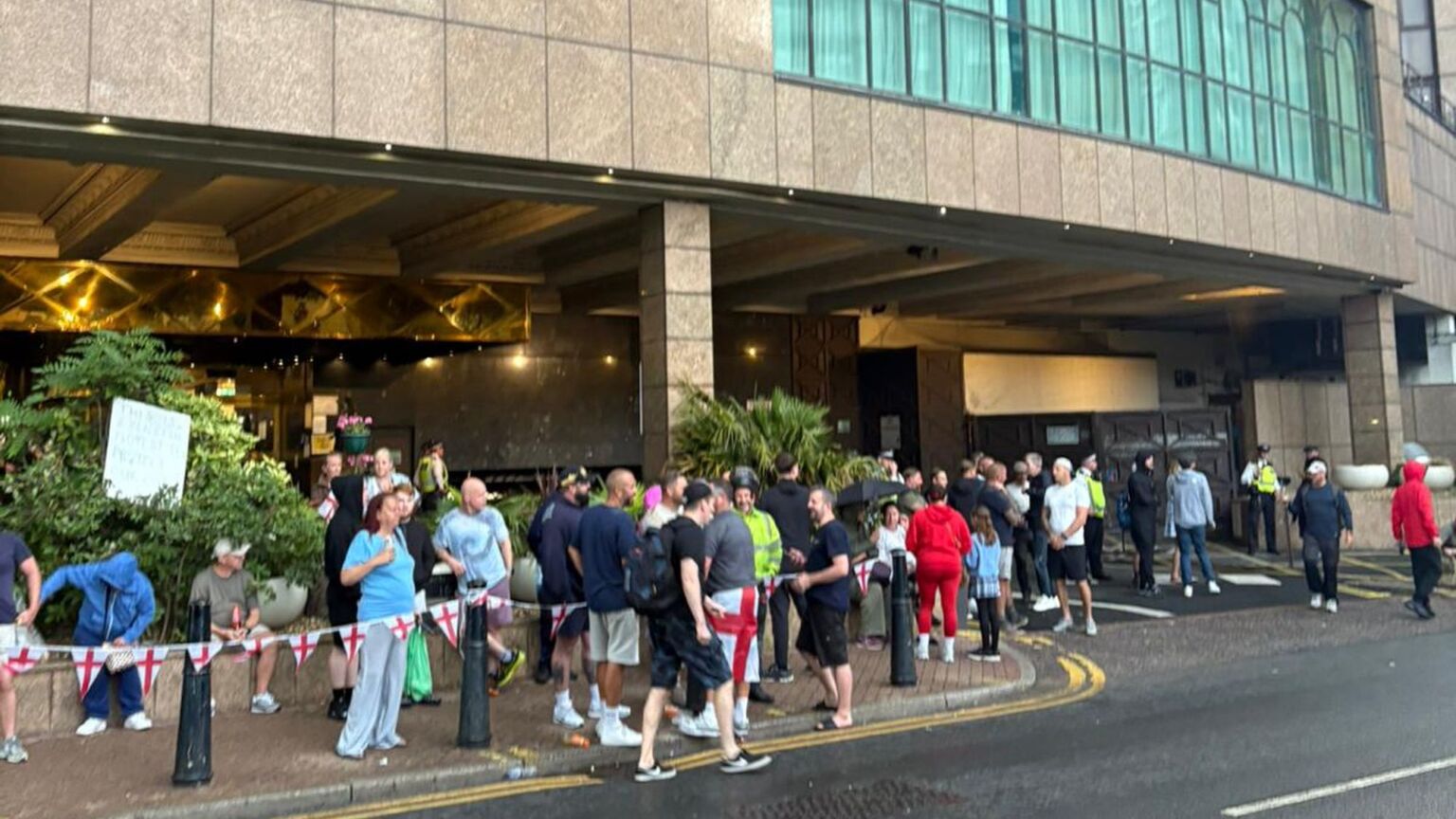England’s anti-asylum protests show no signs of stopping
From Epping to Canary Wharf, tensions are being inflamed by Britain’s broken asylum system.

Want unlimited, ad-free access? Become a spiked supporter.
Canary Wharf in east London has become the latest hotspot in the growing protests against asylum hotels. Last night, protesters gathered outside the Britannia International Hotel within hours of the news spreading that it had been closed to the public to house small-boat arrivals.
Rumours that the Britannia will be used to relocate migrants from the Bell Hotel in Epping, Essex, following days of protests and clashes there, have not been confirmed. However, that the Home Office has landed on Canary Wharf is in itself significant. It suggests that officials are trying – and clearly failing – to find accommodation sites that won’t lead to local flare-ups.
In April 2017, it was revealed that 57 per cent of asylum seekers were placed in the poorest third of Britain. Towns like Knowsley in Merseyside, where violent riots erupted in 2023, were chosen primarily for having the cheapest hotel rooms. Officials seem to have finally twigged that forcing the most deprived parts of the country to bear the brunt of the small-boats crisis was a recipe for social unrest, hence their new choice of Canary Wharf.
After all, as London’s second financial centre, Canary Wharf is largely non-residential. Those who do live in the area are overwhelmingly high flyers, young professionals and students. Many are of Chinese or Vietnamese origin, although there are some remnants of the old East End working class further south on the Isle of Dogs. Canary Wharf is easily one of the most ‘Anywhere’, transient parts of the capital already. An anti-asylum protest here is surely the last thing the authorities expected.
And yet protest people did, albeit in relatively modest numbers. Cars passing by honked their horns in support. Swarms of police officers and riot vans were soon drafted in to protect the hotel. Even a police helicopter flew overhead as the night drew in and protesters, undeterred by the rain or the dark, remained at the site.
What officials seem not to have realised is that block-booking hotel rooms in an area as expensive as Canary Wharf is surely just as likely to infuriate the public. People who are struggling with overpriced rents, who cannot get on the oversubscribed list for social housing, are bound to think it unjust when scarce resources are redirected to propping up a broken asylum system.
Recent anti-migrant protests and riots – including in Knowsley, Epping and Ballymena in Northern Ireland – have tended to follow allegations of sexual assaults and harassment committed by hotel residents against locals. Yet the fact that last night’s protests broke out outside the Britannia before any migrants had been moved there speaks to a souring of the public mood. Merely shunting small-boat arrivals around the country, hoping to find a spot to house them that will keep controversy to a minimum, is clearly not going to be enough to prevent future unrest.
While there have been appalling scenes of riots and far-right agitation outside asylum hotels, which must be fully condemned, peaceful protests like last night’s are an audible sign of a broader public dissatisfaction that must be listened to and taken seriously. People’s concerns, about migration, crime and safety, cannot keep going unaddressed.
As the Canary Wharf protests show, tensions could flare up just about anywhere. The anger at our broken asylum system is nowhere close to dissipating.
Fraser Myers is deputy editor at spiked and host of the spiked podcast. Follow him on X: @FraserMyers.
£1 a month for 3 months
You’ve hit your monthly free article limit.
Support spiked and get unlimited access.
Support spiked – £1 a month for 3 months
spiked is funded by readers like you. Only 0.1% of regular readers currently support us. If just 1% did, we could grow our team and step up the fight for free speech and democracy.
Become a spiked supporter and enjoy unlimited, ad-free access, bonus content and exclusive events – while helping to keep independent journalism alive.
———————————————————————————————————————————–
Exclusive January offer: join today for £1 a month for 3 months. Then £5 a month, cancel anytime.
———————————————————————————————————————————–
Monthly support makes the biggest difference. Thank you.










Comments
Want to join the conversation?
Only spiked supporters and patrons, who donate regularly to us, can comment on our articles.